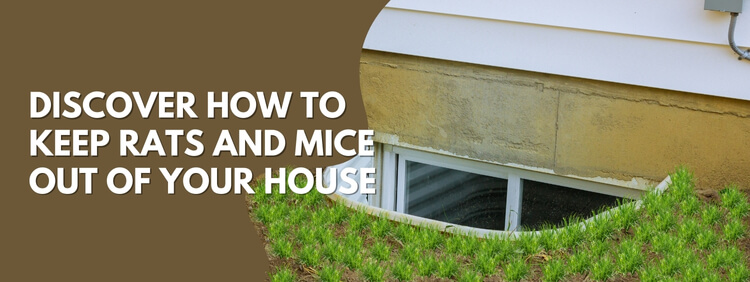 As spring unfolds, every homeowner desires to keep their house free from unwanted visitors - no, not your neighbours - we're talking about those pesky rodents! It may seem like a monumental task, but our team is ready with the best pest control services in Canada to your rescue.
We all know how disturbing it might be when we find mice or rats invading our private space, particularly our window wells. So, have you ever wondered how that dainty mouse is drawn into your house, and more intriguingly - what do mice eat?
This comprehensive guide you’re about to read captures insights, not only about their diet but also about where these creatures might get into your home. It doesn't stop there; it unfolds telling signs of a pesky rat problem and, most importantly, guides you on preventative strategies, especially concentrating on your window wells.
It's not enough to evict these unwanted guests, one must ensure they don't find a way back in!
From the necessity of expertise in eradicating these critters to dissecting DIY methods, there's a wealth of information awaiting your discovery. Set your worry aside regarding rodent control. Our team right here in the heart of Canada is armed with the knowledge and skills you need to keep your home rodent-free this spring.
As spring unfolds, every homeowner desires to keep their house free from unwanted visitors - no, not your neighbours - we're talking about those pesky rodents! It may seem like a monumental task, but our team is ready with the best pest control services in Canada to your rescue.
We all know how disturbing it might be when we find mice or rats invading our private space, particularly our window wells. So, have you ever wondered how that dainty mouse is drawn into your house, and more intriguingly - what do mice eat?
This comprehensive guide you’re about to read captures insights, not only about their diet but also about where these creatures might get into your home. It doesn't stop there; it unfolds telling signs of a pesky rat problem and, most importantly, guides you on preventative strategies, especially concentrating on your window wells.
It's not enough to evict these unwanted guests, one must ensure they don't find a way back in!
From the necessity of expertise in eradicating these critters to dissecting DIY methods, there's a wealth of information awaiting your discovery. Set your worry aside regarding rodent control. Our team right here in the heart of Canada is armed with the knowledge and skills you need to keep your home rodent-free this spring.
What are the Common Entry Points in Your Homes for Rodents?
Understanding where the furry intruders can make their way into your homes is vital in fortifying these areas. Here are some common infiltration points:- Window Wells: The depressions around basement windows are an attractive destination for small mammals seeking shelter. They can easily sneak into your basement through open or broken windows and even gnaw their way through screens.
- Garage Doors: A garage door that doesn’t entirely close leaves enough room for pests to get inside. Once in the garage, they can potentially gain access to the rest of your house.
- Roof and Attic Vents: Vents provide an easy entrance for squirrels and rats. Check your vents regularly for signs of gnawing or other damage.
- Cracks in Walls or Foundations: Even the tiniest of gaps can be widened by rodents using their sharp teeth. Regularly inspect your exterior for cracks or gaps and promptly seal them.
- Pipe and Cable Entries: Mice and rats can fit through spaces that are much smaller than their bodies, making utility entries a common point of access.
- Openings Around Doors and Windows: If there's a slight gap, chances are a rodent may find it and gain access into your home.
What are the Typical Behaviours and Diets of Rodents?
Understanding the distinct behaviours and dietary habits of common intruders like mice and rats is key to keeping them from wandering into your dwelling spaces. These insights make you aware of the signs to look out for, enabling a timely intervention.- Activity Cycle: These creatures are primarily nocturnal. They seek safety during daytime hours and venture out for food and exploration under the cover of darkness.
- Social Behaviour: While some rodents are mutually indulgent, others prefer to lead solitary lifestyles. However, all unite speedily if they sense food nearby.
- Nibbling Instincts: They have a propensity to chew on various materials, which can result in considerable damage to domestic elements such as wiring, insulation, pipes, and even structural elements of your home.
- Voracious Eaters: In terms of their meals, they are not particularly fussy. They generally consume grains, fruits, seeds, vegetables, meat scraps and many household items. The phrase, 'What do mice eat?’ is practically synonymous with, 'What is accessible?’
What are the Signs of a Rodent Infestation?
Being vigilant and staying alert to the various hints that may indicate the unwelcome presence of these tiny intruders is crucial. Recognizing the subtle hints early on can save you a lot of stress and damage to your home. Here are some signs that should have you taking immediate action:- Unusual Noises, Particularly at Night: Rodents are nocturnal creatures and are usually active when the house is quiet. If you hear scurrying in your walls or ceiling, you likely have a rodent problem.
- Droppings: These are usually found in hidden areas such as the attic, basement, and clipboards. The droppings are small with pointed ends and are a definite sign of an infestation.
- Unexplained Damage: Gnaw marks on furniture, bags, and cables caused by the rodent's need to constantly sharpen their teeth serve as tangible evidence of their presence.
- Nests: Rodents search for warm, cozy spaces in your home to set up their nests. They use shredded paper or fabric usually hidden in corners or behind appliances.
- Unusual Pet Behaviour: Pets are often more sensitive to the presence of rodents. If your pet is reacting to a place in your house in an unusual manner, it might be worth investigating.
- Track Marks: Rats often follow the same routes when they move around and can leave a trail of grease or dirt behind.
What are the Potential Dangers of a Long-Term Rodent Problem?
Rodents can cause more than just exterior damages; their presence could have multiple severe consequences. Allow us to unfold the potential impacts of unchecked mouse or rat infestations:- Health Risks: Rodents can carry various diseases, such as hantavirus, salmonellosis, and plague. These diseases can be transmitted either directly or indirectly, posing a significant threat to the health and safety of your household.
- Damage to Property: These rodents have strong teeth that can gnaw through almost any material, including wood, plastic, and even steel. This could result in serious structural damage to your building, leading to costly repairs.
- Contamination of Food and Surfaces: Rodents harbour harmful bacteria and can contaminate any item or surface they come into contact with, especially your food sources. This can lead to foodborne illnesses within the household.
- Allergens: Some people, particularly children, may develop allergies or asthma from exposure to rodent droppings and urine.
Why is DIY Rodent Control Often Ineffective?
 Your initial belief might be that managing mice or rats in your living space might be a straightforward do-it-yourself task. However, this assumption could lead to significant issues down the line. Innovative internet tutorials and ready-made home "solutions" could worsen the issue instead of mitigating it. Here's why:
Your initial belief might be that managing mice or rats in your living space might be a straightforward do-it-yourself task. However, this assumption could lead to significant issues down the line. Innovative internet tutorials and ready-made home "solutions" could worsen the issue instead of mitigating it. Here's why:
- Insufficient Knowledge: Rodents have stringent habits and inclinations. A detailed understanding of their behaviours, like feeding cycles or nesting tendencies, is essential for creating an effective plan to thwart their intrusion. Most homeowners lack this insight, resulting in time-consuming and ineffective efforts.
- Incorrect Identification: In many cases, the type of intruder could be inaccurately recognized. Using a remedy made for another species can be futile, allowing the unwelcome guests to continue multiplying.
- Re-Infestation: Without professional aid, there might be a lack of a thorough and systematic approach. Key problem areas might be overlooked, creating a conducive environment for a re-infestation.
- Health Risks: DIY methods could put you and your family at risk. Incorrect application or disposal of certain chemicals can be harmful and hazardous to health.
How Do You Keep Rats and Mice Out of Your House?
Need to know how to keep rats and mice out of your house? As homeowners, we often face the problem of deterring unwanted visitors like rats and mice, especially during spring. Let's delve into some effective strategies to safeguard your home from these intruders.- Seal Entry Points: First and foremost, secure any openings that may serve as access for pests. This can aid in the elimination of potential infestations.
- Maintain Cleanliness: Messy areas, such as your kitchen or basement, can often act as a food source for these pests. Regular cleaning decreases the likelihood of attracting them.
- Properly Store Food: Rodents are motivated by food; thus, storing your edibles securely makes your living space less appealing.
- Eliminate Hiding Spots: Clear out clutter, such as piles of boxes or garden debris, where rodents might take shelter.
What are the 5 Steps to Control Your Rodent Problem?
Controlling a pest issue, particularly related to mice and rats, is often a daunting task. This is especially true when they've managed to make their entrances through hard-to-reach spaces like window wells. Not to worry, we have outlined a step-by-step guide to help you in this regard.- Inspection: Start by examining your home for places where rodents might invade. Check the walls, attic, basement, and most notably, your window wells. This crucial step helps you understand the full extent of your problem.
- Sanitation: Cleanliness can significantly deter pests. Ensure your house, especially food storage and disposal areas, is tidy and free from clutter. Cleaning will not only "keep" the rats and mice away but also reduce their sources of food.
- Sealing: Once you have identified potential entry points, seal them up. Rats and mice can squeeze through surprisingly small spaces, so don't ignore even the tiniest cracks or gaps. Pay particular attention to your window wells.
- Treatment: Use traps or baits in areas where you observe rodent activity. Remember to keep these solutions out of reach of pets and children.
- Regular Monitoring: Regular checks help catch new signs of an "infestation" early. This allows you to take prompt action and ensures your house remains rodent-free.
What are the Benefits of Hiring a Rodent Control and Prevention Expert?
By seeking the assistance of professionals offering pest control services, you are choosing a comprehensive approach to your rodent dilemma. This decision provides numerous benefits:- Expertise: Professional teams have the training and expertise to not only handle the current pests in your living space but to prevent future invasions as well.
- Effective Solutions: Pest experts utilize tested methods for eliminating rodents, ensuring lasting results compared to DIY solutions.
- All-Inclusive Approach: Pest service providers consider all facets of the problem, from the type of rodent to their habits and the harm they pose to your home.
- Safe and Humane: These experts use ethical techniques for capturing and evicting rodents, ensuring the safety of your household and the creatures involved.
- Prevention: They don't stop at eliminating the existing problem; they safeguard your home against future infestations by identifying potential entry points such as windows and roof gaps.

